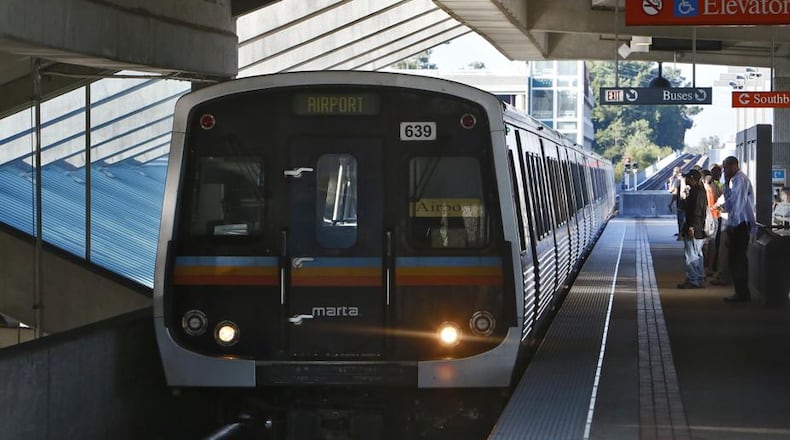MARTA is close to reaching an agreement with local governments to extend a crucial sales tax to support its operations.
A contract amendment approved by the MARTA board this month would extend the penny sales tax collected in three counties for another decade, through 2057. The amendment also accounts for the agency's planned Atlanta expansion, as well as possible expansions in DeKalb and Fulton counties.
But the negotiations — which dragged on for two years — have laid bare political tensions dredged up as MARTA expands into the suburbs and contemplates new services in existing areas. Longtime MARTA members — notably DeKalb — want to make sure their constituents get their share of services as the agency expands, even as newcomers cut what some consider to be better deals.
“We all want our fair share,” said DeKalb County Commissioner Jeff Rader, who has been involved in the negotiations. “Everyone wants as much as they can get.”
The stakes are high for MARTA, which needs the sales tax extension to borrow hundreds of millions of dollars to pay for new rail cars, station renovations and other capital projects. MARTA CEO Jeffrey Parker believes the latest draft of the contract will pass muster with each jurisdiction in coming weeks.
“I believe they’re satisfied,” Parker said. “We’ve spent a lot of time talking through issues.”
Under state law, MARTA operates under a contract with the local jurisdictions where it provides services. For most of its existence, that meant DeKalb and Fulton counties and the city of Atlanta. A big chunk of the agency’s revenue comes from a penny sales tax collected in those jurisdictions.
Over the decades, that contract has been amended 14 times to extend the sales tax and account for other changing circumstances. The last amendment came in 2014, when Clayton County voters agreed to join MARTA and pay a penny sales tax for transit.
But Clayton cut a special deal with MARTA: Half its penny would be set aside to pay for future projects such as commuter rail and bus rapid transit lines in the county. MARTA uses the rest to provide bus service in Clayton and to help maintain the rest of its system.
MARTA's deal with Clayton was a model that others would follow. Atlanta voters approved an additional half-penny transit sales tax in 2016. The additional money can be used only for transit expansion in the city.
And last year Gwinnett County reached a similar arrangement as it sought to join MARTA. The deal required Gwinnett initially to set aside just 29% of its proposed penny sales tax to support the larger MARTA system and to cover the cost of providing bus service in the county. It also included other provisions that gave Gwinnett greater control over sales taxes generated there.
Rader believes Gwinnett should be required to spend more on the existing MARTA system.
“If you want to go to the airport from Gwinnett Place Mall, you ought to be invested and participating in the maintenance of that system,” he said.
The issue became moot when Gwinnett voters rejected the contract earlier this year. But Gwinnett officials have made clear they may send a similar proposal to voters as soon as next year.
All those deals involved new sales taxes — not the "core penny" sales tax that has supported MARTA service for decades. But last year Fulton struck a deal that requires MARTA to pay the operating costs of future bus rapid transit lines on Ga. 400 and South Fulton Parkway out of the existing penny sales tax.
That’s left DeKalb officials wondering what more they can get for their existing tax money.
The county didn’t win any major new service under the new contract provisions — dubbed the “15th amendment.” But it pressed MARTA to specify when it planned to complete station renovations to be paid for out of the core penny sales tax. Those dates are now included.
The county also won a provision that allows local governments a say in whether companies can receive tax breaks for developing property around MARTA stations. And MARTA agreed to a provision allowing the local jurisdictions to reopen contract negotiations if a new county — such as Gwinnett — joins.
MARTA board member Robbie Ashe, who represents Atlanta, believes the latest draft of the contract amendment concedes too much. He voted against it.
Ashe said the tax break provision may make it harder to develop property around MARTA stations. And he expressed frustration with the drawn-out negotiations. He suggested that some jurisdictions wouldn’t take “yes” for an answer, requesting more concessions once their original demands were met.
“It feels like the goal line keeps moving,” he said.
Parker, the MARTA CEO, downplayed the political tensions.
“There’s a lot of details in here. It’s working through all of those details,” he said. “I run MARTA. The elected officials who have to consider this have a lot of things going on.”
With the MARTA board’s approval, officials in Atlanta and Clayton, DeKalb and Fulton counties have 60 days to approve the contract amendment. Three of the four jurisdictions must approve it.
About the Author
The Latest
Featured



